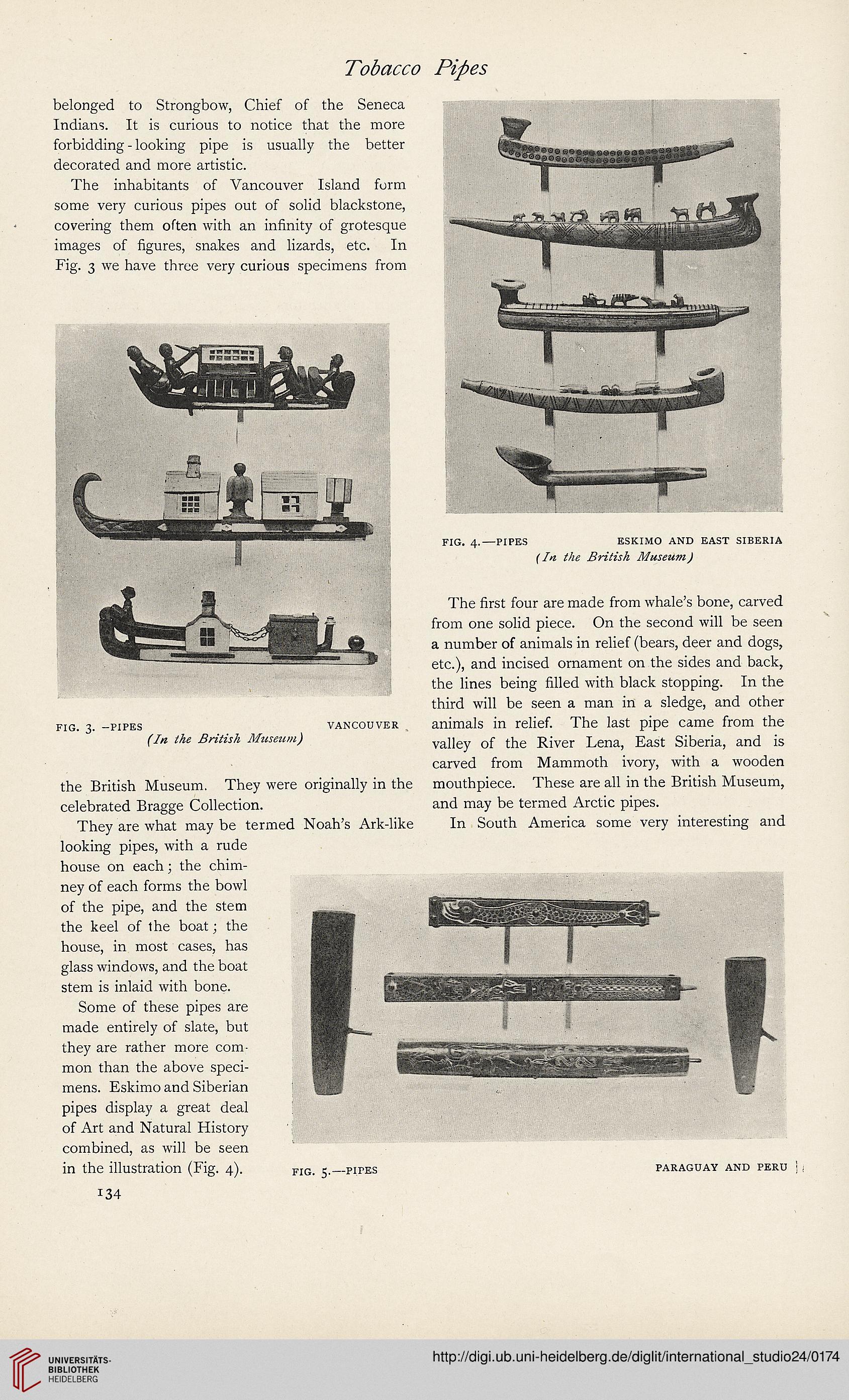Tobacco Pipes
belonged to Strongbow, Chief of the Seneca
Indians. It is curious to notice that the more
forbidding - looking pipe is usually the better
decorated and more artistic.
The inhabitants of Vancouver Island form
some very curious pipes out of solid blackstone,
covering them often with an infinity of grotesque
images of figures, snakes and lizards, etc. In
Fig. 3 we have three very curious specimens from
FIG. 4.—PIPES ESKIMO AND EAST SIBERIA
CIn the British Museum)
FIG. 3. -PIPES
(In the British Museum)
VANCOUVER
the British Museum. They were originally in the
celebrated Bragge Collection.
They are what may be termed Noah’s Ark-like
looking pipes, with a rude
house on each; the chim-
ney of each forms the bowl
of the pipe, and the stem
the keel of Ihe boat; the
house, in most cases, has
glass windows, and the boat
stem is inlaid with bone.
Some of these pipes are
made entirely of slate, but
they are rather more com-
mon than the above speci-
mens. Eskimo and Siberian
pipes display a great deal
of Art and Natural History
combined, as will be seen
in the illustration (Fig. 4). FIG. 5.—pipes
The first four are made from whale’s bone, carved
from one solid piece. On the second will be seen
a number of animals in relief (bears, deer and dogs,
etc.), and incised ornament on the sides and back,
the lines being filled with black stopping. In the
third will be seen a man in a sledge, and other
animals in relief. The last pipe came from the
valley of the River Lena, East Siberia, and is
carved from Mammoth ivory, with a wooden
mouthpiece. These are all in the British Museum,
and may be termed Arctic pipes.
In South America some very interesting and
PARAGUAY AND PERU
134
belonged to Strongbow, Chief of the Seneca
Indians. It is curious to notice that the more
forbidding - looking pipe is usually the better
decorated and more artistic.
The inhabitants of Vancouver Island form
some very curious pipes out of solid blackstone,
covering them often with an infinity of grotesque
images of figures, snakes and lizards, etc. In
Fig. 3 we have three very curious specimens from
FIG. 4.—PIPES ESKIMO AND EAST SIBERIA
CIn the British Museum)
FIG. 3. -PIPES
(In the British Museum)
VANCOUVER
the British Museum. They were originally in the
celebrated Bragge Collection.
They are what may be termed Noah’s Ark-like
looking pipes, with a rude
house on each; the chim-
ney of each forms the bowl
of the pipe, and the stem
the keel of Ihe boat; the
house, in most cases, has
glass windows, and the boat
stem is inlaid with bone.
Some of these pipes are
made entirely of slate, but
they are rather more com-
mon than the above speci-
mens. Eskimo and Siberian
pipes display a great deal
of Art and Natural History
combined, as will be seen
in the illustration (Fig. 4). FIG. 5.—pipes
The first four are made from whale’s bone, carved
from one solid piece. On the second will be seen
a number of animals in relief (bears, deer and dogs,
etc.), and incised ornament on the sides and back,
the lines being filled with black stopping. In the
third will be seen a man in a sledge, and other
animals in relief. The last pipe came from the
valley of the River Lena, East Siberia, and is
carved from Mammoth ivory, with a wooden
mouthpiece. These are all in the British Museum,
and may be termed Arctic pipes.
In South America some very interesting and
PARAGUAY AND PERU
134




